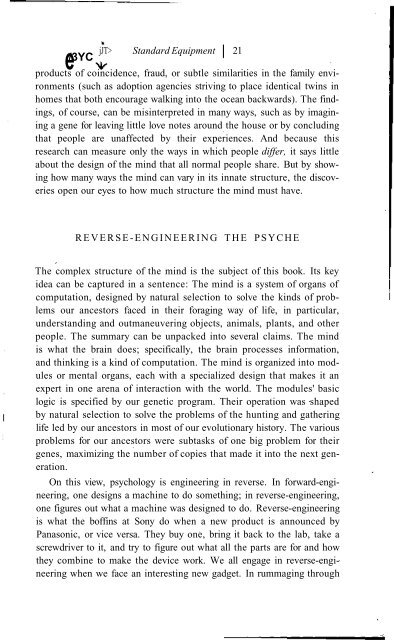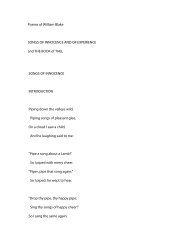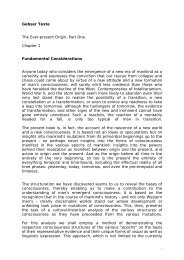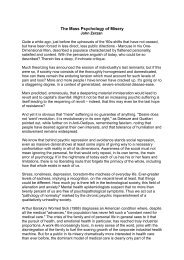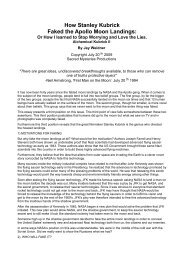- Page 1 and 2: # # # # 'E ACCLAIMED BESTSELLER BY
- Page 3 and 4: PENGUIN BOOKS HOW THE MIND WORKS 'A
- Page 5 and 6: HOW THE MIND WORKS Steven Pinker ©
- Page 7 and 8: FOR ILAVENIL
- Page 9 and 10: PREFACE Any book called How the Min
- Page 11 and 12: Preface xi man, Paul Smolensky, Eli
- Page 13 and 14: HOW THE MIND WORKS
- Page 15 and 16: 4 1 HOW THE MIND WORKS But the gap
- Page 17 and 18: 6 | HOW THE MIND WORKS Each number
- Page 19 and 20: 8 HOW THE MIND WORKS scenes as milk
- Page 21 and 22: 10 1 HOW THE MIND WORKS 4 And these
- Page 23 and 24: 12 HOW THE MIND WORKS own; so would
- Page 25 and 26: 14 HOW THE MIND WORKS at 9 A.M. and
- Page 27 and 28: 16 I HOW THE MIND WORKS robot an or
- Page 29 and 30: 18 ) HOW THE MIND WORKS puters of 1
- Page 31: 20 HOW THE MIND WORKS and asks his
- Page 35 and 36: 24 I HOW THE MIND WORKS apes. And t
- Page 37 and 38: 26 HOW THE MIND WORKS There are bir
- Page 39 and 40: 28 HOW THE MIND WORKS mechanisms. T
- Page 41 and 42: 30 HOW THE MIND WORKS ogy—we try
- Page 43 and 44: 32 HOW THE MIND WORKS without built
- Page 45 and 46: 34 J HOW THE MIND WORKS ingless, bu
- Page 47 and 48: 36 | HOW THE MIND WORKS more like a
- Page 49 and 50: 38 HOW THE MIND WORKS dare to seek
- Page 51 and 52: 40 1 HOW THE MIND WORKS novel foods
- Page 53 and 54: 42 HOW THE MIND WORKS First, select
- Page 55 and 56: 44 | HOW THE MIND WORKS the fertili
- Page 57 and 58: 46 J HOW THE MIND WORKS one of the
- Page 59 and 60: 48 | HOW THE MIND WORKS reflect not
- Page 61 and 62: 50 1 HOW THE MIND WORKS duction and
- Page 63 and 64: 52 | HOW THE MIND WORKS nity ward,
- Page 65 and 66: 54 HOW THE MIND WORKS strual syndro
- Page 67 and 68: 56 | HOW THE MIND WORKS National La
- Page 69 and 70: 58 J HOW THE MIND WORKS vermin of b
- Page 71 and 72: 60 | HOW THE MIND WORKS for his los
- Page 73 and 74: 62 | HOW THE MIND WORKS fixed; whet
- Page 75 and 76: 64 | HOW THE MIND WORKS or scientis
- Page 77 and 78: 66 J HOW THE MIND WORKS effects. Wh
- Page 79 and 80: 68 J HOW THE MIND WORKS obeys mathe
- Page 81 and 82: 70 HOW THE MIND WORKS standing the
- Page 83 and 84:
72 HOW THE MIND WORKS answer these
- Page 85 and 86:
74 J HOW THE MIND WORKS Long-Term M
- Page 87 and 88:
76 HOW THE MIND WORKS mark identica
- Page 89 and 90:
78 | HOW THE MIND WORKS "images" ar
- Page 91 and 92:
80 HOW THE MIND WORKS You still mig
- Page 93 and 94:
82 | HOW THE MIND WORKS ognize alph
- Page 95 and 96:
84 HOW THE MIND WORKS neurons that
- Page 97 and 98:
86 HOW THE MIND WORKS Suppose it ta
- Page 99 and 100:
88 I HOW THE MIND WORKS have been a
- Page 101 and 102:
90 I HOW THE MIND WORKS to a much b
- Page 103 and 104:
92 | HOW THE MIND WORKS Simon's arg
- Page 105 and 106:
94 J HOW THE MIND WORKS Searle says
- Page 107 and 108:
96 | HOW THE MIND WORKS mate reply
- Page 109 and 110:
98 | HOW THE MIND WORKS The Emperor
- Page 111 and 112:
100 I HOW THE MIND WORKS incoming l
- Page 113 and 114:
102 HOW THE MIND WORKS vegetable bu
- Page 115 and 116:
104 J HOW THE MIND WORKS With this
- Page 117 and 118:
106 | HOW THE MIND WORKS because se
- Page 119 and 120:
108 J HOW THE MIND WORKS young, and
- Page 121 and 122:
110 I HOW THE MIND WORKS up its inp
- Page 123 and 124:
112 HOW THE MIND WORKS CONNECTOPLAS
- Page 125 and 126:
114 | HOW THE MIND WORKS ity. The d
- Page 127 and 128:
116 1 HOW THE MIND WORKS with an ex
- Page 129 and 130:
118 | HOW THE MIND WORKS reintroduc
- Page 131 and 132:
120 | HOW THE MIND WORKS just a ver
- Page 133 and 134:
122 I HOW THE MIND WORKS roles. The
- Page 135 and 136:
124 HOW THE MIND WORKS puters, afte
- Page 137 and 138:
126 HOW THE MIND WORKS I he human m
- Page 139 and 140:
128 HOW THE MIND WORKS matic." Thei
- Page 141 and 142:
130 I HOW THE MIND WORKS that makes
- Page 143 and 144:
132 I HOW THE MIND WORKS mind, even
- Page 145 and 146:
134 HOW THE MIND WORKS . . . Specia
- Page 147 and 148:
136 J HOW THE MIND WORKS by the del
- Page 149 and 150:
138 HOW THE MIND WORKS or you start
- Page 151 and 152:
140 HOW THE MIND WORKS The advantag
- Page 153 and 154:
142 HOW THE MIND WORKS around unglu
- Page 155 and 156:
144 J HOW THE MIND WORKS collection
- Page 157 and 158:
146 I HOW THE MIND WORKS • What i
- Page 159 and 160:
148 J HOW THE MIND WORKS behavior,
- Page 161 and 162:
150 HOW THE MIND WORKS GET SMART Th
- Page 163 and 164:
152 | HOW THE MIND WORKS could it b
- Page 165 and 166:
154 HOW THE MIND WORKS every imagin
- Page 167 and 168:
156 | HOW THE MIND WORKS food, or c
- Page 169 and 170:
158 HOW THE MIND WORKS has clear -
- Page 171 and 172:
160 | HOW THE MIND WORKS rummy hand
- Page 173 and 174:
162 HOW THE MIND WORKS machines, an
- Page 175 and 176:
164 J HOW THE MIND WORKS than its r
- Page 177 and 178:
166 J HOW THE MIND WORKS complex or
- Page 179 and 180:
168 J HOW THE MIND WORKS much honou
- Page 181 and 182:
170 J HOW THE MIND WORKS How can an
- Page 183 and 184:
172 [ HOW THE MIND WORKS "Subtle de
- Page 185 and 186:
174 HOW THE MIND WORKS And most imp
- Page 187 and 188:
176 | HOW THE MIND WORKS the point
- Page 189 and 190:
178 | HOW THE MIND WORKS have built
- Page 191 and 192:
180 J HOW THE MIND WORKS common vie
- Page 193 and 194:
182 J HOW THE MIND WORKS passes on
- Page 195 and 196:
184 I HOW THE MIND WORKS for unders
- Page 197 and 198:
186 J HOW THE MIND WORKS paradoxes
- Page 199 and 200:
188 1 HOW THE MIND WORKS J it is no
- Page 201 and 202:
190 J HOW THE MIND WORKS The hunter
- Page 203 and 204:
192 I HOW THE MIND WORKS walked a f
- Page 205 and 206:
194 | HOW THE MIND WORKS social, in
- Page 207 and 208:
196 J HOW THE MIND WORKS back as so
- Page 209 and 210:
198 | HOW THE MIND WORKS and were v
- Page 211 and 212:
200 HOW THE MIND WORKS Millions of
- Page 213 and 214:
202 I HOW THE MIND WORKS into a bas
- Page 215 and 216:
204 J HOW THE MIND WORKS tor said i
- Page 217 and 218:
206 HOW THE MIND WORKS The first cl
- Page 219 and 220:
208 | HOW THE MIND WORKS there was
- Page 221 and 222:
210 I HOW THE MIND WORKS cultural c
- Page 223 and 224:
212 | HOW THE MIND WORKS display ca
- Page 225 and 226:
214 J HOW THE MIND WORKS verbal min
- Page 227 and 228:
216 HOW THE MIND WORKS room, the re
- Page 229 and 230:
218 | HOW THE MIND WORKS and to com
- Page 231 and 232:
220 HOW THE MIND WORKS The late dis
- Page 233 and 234:
222 | HOW THE MIND WORKS The eyes a
- Page 235 and 236:
224 I HOW THE MIND WORKS concerting
- Page 237 and 238:
226 J HOW THE MIND WORKS Brewster a
- Page 239 and 240:
228 HOW THE MIND WORKS spot on one
- Page 241 and 242:
M/ 230 | HOW THE MIND WORKS the com
- Page 243 and 244:
232 HOW THE MIND WORKS repeat thems
- Page 245 and 246:
234 I HOW THE MIND WORKS David Marr
- Page 247 and 248:
hay of processors, one for each mat
- Page 249 and 250:
%Mind's Eye 1 237 pen vertically in
- Page 251 and 252:
The MinJ's Eye | 239 In monkeys it'
- Page 253 and 254:
The Mind's Eye | 241 precocious bab
- Page 255 and 256:
The Mind's Eye 243 left drawing, pa
- Page 257 and 258:
The Mind's Eye 245 lished a list of
- Page 259 and 260:
The Mind's Eye | 247 ing in color p
- Page 261 and 262:
The Mind's Eye | 249 the flesh and
- Page 263 and 264:
The Mini's Eye | 251 Finally, the f
- Page 265 and 266:
The Mind's Eye | 253 costs, where c
- Page 267 and 268:
The Mind's Eye 255 image, and it ju
- Page 269 and 270:
The Mind's Eye | 257 But now is the
- Page 271 and 272:
The Mind's Eye j 259 Is a nose an o
- Page 273 and 274:
The Mind's Eye 261 of forms with bl
- Page 275 and 276:
The Mind's Eye 263 text or graphics
- Page 277 and 278:
The Mind's Eye 265 "You're staying
- Page 279 and 280:
The Mind's Eye 267 The shape at the
- Page 281 and 282:
The Mind's Eye 269 But suppose that
- Page 283 and 284:
The Mind's Eye | 271 cylinder with
- Page 285 and 286:
The Mind's Eye 273 before the tests
- Page 287 and 288:
The Mind's Eye | 275 object doesn't
- Page 289 and 290:
The Mind's Eye 277 iment would ever
- Page 291 and 292:
The Mind's Eye 279 Now, Cooper and
- Page 293 and 294:
The Mind's Eye 281 D H D K h3 The s
- Page 295 and 296:
The Mind's Eye 283 once a second. T
- Page 297 and 298:
The Mind's Eye j 285 an ability to
- Page 299 and 300:
The Mind's Eye 287 One can even mak
- Page 301 and 302:
The Mind's Eye | 289 patients named
- Page 303 and 304:
The Mind's Eye | 291 this request:
- Page 305 and 306:
The Mind's Eye 293 If the mind stor
- Page 307 and 308:
The Mind's Eye | 295 Memory images
- Page 309 and 310:
The Mind's Eye | 297 what appears t
- Page 311 and 312:
5 GOOD IDEAS Ihope you have not mur
- Page 313 and 314:
Good Ideas | 301 Stephen Jay Gould,
- Page 315 and 316:
Good Ideas | 303 Experimenter: Flum
- Page 317 and 318:
Good Ideas 305 resulting laws to a
- Page 319 and 320:
Good Ideas 307 The other putative r
- Page 321 and 322:
Good Ideas | 309 Now we can explain
- Page 323 and 324:
Good Ideas 311 diverge so unevenly
- Page 325 and 326:
Good Ideas 313 If people form stere
- Page 327 and 328:
Good Ideas 315 of the world. There
- Page 329 and 330:
Good Ideas | 317 of persisting obje
- Page 331 and 332:
Good Ideas [319 behind the right ed
- Page 333 and 334:
Good Ideas 321 top, which leans wit
- Page 335 and 336:
Good Ideas 323 ways of knowing. Mos
- Page 337 and 338:
Good Ideas 325 new releases or clas
- Page 339 and 340:
Good Ideas | 327 different appearan
- Page 341 and 342:
Good Ideas 329 Graham Bell's biogra
- Page 343 and 344:
Good Ideas 331 knowledge, put thems
- Page 345 and 346:
Good Ideas 333 In another sense, of
- Page 347 and 348:
Good Ideas 335 both"—you get only
- Page 349 and 350:
Good Ideas 337 rule is a contract,
- Page 351 and 352:
Good Ideas 339 Human adults use sev
- Page 353 and 354:
Good Ideas 341 objects other than t
- Page 355 and 356:
Good Ideas 343 "I shall never belie
- Page 357 and 358:
Good Ideas 345 rules of thumb. One
- Page 359 and 360:
Good Ideas 347 tion designed to def
- Page 361 and 362:
Good Ideas | 349 circles in cornfie
- Page 363 and 364:
Good Ideas 351 give numbers to sing
- Page 365 and 366:
The messenger is in Istanbul. The m
- Page 367 and 368:
Good Ideas 355 The very same word,
- Page 369 and 370:
Good Ideas 357 Can I have any readi
- Page 371 and 372:
Good Ideas 359 mental categories li
- Page 373 and 374:
Good Ideas 361 The image came out o
- Page 375 and 376:
6 HOTHEADS On March 13, 1996, Thoma
- Page 377 and 378:
Hotheads 365 bodily distress. Spart
- Page 379 and 380:
Hotheads | 367 allows new coinages
- Page 381 and 382:
Hotheads | 369 the trivial rather t
- Page 383 and 384:
Hotheads 371 the Modern Mammalian B
- Page 385 and 386:
Hotheads | 373 apartment, I can for
- Page 387 and 388:
Hotheads | 375 places are inviting,
- Page 389 and 390:
Hotheads 377 The land itself must b
- Page 391 and 392:
Hotheads 379 but most people won't
- Page 393 and 394:
Hotheads | 381 the two laws of symp
- Page 395 and 396:
Hotheads | 383 thing they touch? It
- Page 397 and 398:
Hotheads 385 ruminants like sheep,
- Page 399 and 400:
Hotheads | 387 scrutiny, and of lea
- Page 401 and 402:
Hotheads | 389 so much as awaken it
- Page 403 and 404:
Hotheads | 391 our ancestors were n
- Page 405 and 406:
Hotheads 393 psychology of pleasure
- Page 407 and 408:
Hotheads 395 The political scientis
- Page 409 and 410:
Hotheads | 397 tude, make us want t
- Page 411 and 412:
Hotheads | 399 tattoo, having her n
- Page 413 and 414:
Hotheads | 401 safe. What is selfis
- Page 415 and 416:
Hotheads | 403 tions. An animal mus
- Page 417 and 418:
Hotheads 405 they may become public
- Page 419 and 420:
Hotheads 407 desire for a comfortab
- Page 421 and 422:
Hotheads j 409 The German-accented,
- Page 423 and 424:
Hotheads | 411 only when the threat
- Page 425 and 426:
Hotheads 413 tecture of the brain;
- Page 427 and 428:
Hotheads 415 the real ones, people
- Page 429 and 430:
Hotheads 417 FOOLS FOR LOVE Why doe
- Page 431 and 432:
Hotheads | 419 standing, the sneeri
- Page 433 and 434:
Hotheads 421 you didn't grieve when
- Page 435 and 436:
Hotheads | 423 But that's not right
- Page 437 and 438:
7 FAMILY VALUES Come on, people now
- Page 439 and 440:
Family Values 427 makeup. In fact t
- Page 441 and 442:
Family Values 429 deplore it. And p
- Page 443 and 444:
Family Values 431 descendants of sl
- Page 445 and 446:
Family Values 433 are relatively ha
- Page 447 and 448:
Family Values 435 nist is the ultim
- Page 449 and 450:
Family Values 437 a spouse for my c
- Page 451 and 452:
Family Values 439 For millennia, ki
- Page 453 and 454:
Family Values 441 the next generati
- Page 455 and 456:
Family Values 443 children. The mot
- Page 457 and 458:
Family Values 445 decision of wheth
- Page 459 and 460:
Family Values 447 (Effective birth
- Page 461 and 462:
Family Values 449 at random. The bi
- Page 463 and 464:
Family Values 451 The most pervasiv
- Page 465 and 466:
Family Values 453 grief correlates
- Page 467 and 468:
Family Values 455 that served them
- Page 469 and 470:
Family Values 457 tion to family me
- Page 471 and 472:
Family Values 459 not a relative, t
- Page 473 and 474:
Family Values 461 is universal, and
- Page 475 and 476:
Family Values 463 rest of a cell. S
- Page 477 and 478:
Family Values 465 weighing one ten-
- Page 479 and 480:
Family Values 467 contributions are
- Page 481 and 482:
Family Values 469 "optimal," they w
- Page 483 and 484:
Family Values 471 of times," replie
- Page 485 and 486:
Family Values 473 mass-market equiv
- Page 487 and 488:
Family Values . 475 not hire themse
- Page 489 and 490:
Family Values 477 are always jealou
- Page 491 and 492:
Family Values 479 All of these intr
- Page 493 and 494:
Family Values 481 fathers her child
- Page 495 and 496:
Family Values 483 The humorist Fran
- Page 497 and 498:
Family Values 485 By the callous re
- Page 499 and 500:
Family Values 487 Rabbit's—becaus
- Page 501 and 502:
Family Values 489 unfaithful and ar
- Page 503 and 504:
Family Values 491 fathers and broth
- Page 505 and 506:
Family Values 493 express anger tow
- Page 507 and 508:
Family Values 495 cedes because he
- Page 509 and 510:
Family Values 497 fits, he could ex
- Page 511 and 512:
Family Values 499 Status is the pub
- Page 513 and 514:
Family Values 501 mate with. Theore
- Page 515 and 516:
Family Values 503 the same time. Ne
- Page 517 and 518:
Family Values 505 Foraging peoples,
- Page 519 and 520:
Family Values 507 and offer to pay
- Page 521 and 522:
Family Values 509 and so on. This r
- Page 523 and 524:
Family Values 511 your husband, you
- Page 525 and 526:
Family Values 513 distinguish from
- Page 527 and 528:
Family Values 515 Tooby and Cosmide
- Page 529 and 530:
Family Values 517 many flights. But
- Page 531 and 532:
Family Values 519 glimmering of the
- Page 533 and 534:
8 THE MEANING OF LIFE an does not l
- Page 535 and 536:
The Meaning of Life 523 Mozart once
- Page 537 and 538:
The Meaning of Life 525 out the mes
- Page 539 and 540:
The Meaning of Life 527 parts of th
- Page 541 and 542:
The Meaning of Life 529 grew up wit
- Page 543 and 544:
The Meaning of Life 531 end on it,
- Page 545 and 546:
ale uI.galiueu 111 irilee ulllererl
- Page 547 and 548:
534 I HOW THE MIND WORKS maximum re
- Page 549 and 550:
536 | HOW THE MIND WORKS What does
- Page 551 and 552:
538 J HOW THE MIND WORKS walking, r
- Page 553 and 554:
540 J HOW THE MIND WORKS ings, whic
- Page 555 and 556:
542 | HOW THE MIND WORKS dren and f
- Page 557 and 558:
544 HOW THE MIND WORKS Can anything
- Page 559 and 560:
546 j HOW THE MIND WORKS to continu
- Page 561 and 562:
548 HOW THE MIND WORKS butt of a jo
- Page 563 and 564:
550 J HOW THE MIND WORKS Lady Astor
- Page 565 and 566:
552 HOW THE MIND WORKS Third, the m
- Page 567 and 568:
554 J HOW THE MIND WORKS of a domin
- Page 569 and 570:
556 J HOW THE MIND WORKS Let's focu
- Page 571 and 572:
558 J HOW THE MIND WORKS with a bet
- Page 573 and 574:
560 J HOW THE MIND WORKS solution i
- Page 575 and 576:
562 | HOW THE MIND WORKS We can wel
- Page 577 and 578:
564 J HOW THE MIND WORKS view that
- Page 579 and 580:
NOTES 1. Standard Equipment Page 6
- Page 581 and 582:
Notes to Pages 44-80 | 569 44 The S
- Page 583 and 584:
Notes to Pages 112-133 | 571 112 Pa
- Page 585 and 586:
Notes to Pages 162-186 | 573 162 Ev
- Page 587 and 588:
Notes to Pages 207-245 | 575 207 Ad
- Page 589 and 590:
Notes to Pages 277-297 \ 577 277 Ob
- Page 591 and 592:
Notes to Pages 326-345 | 579 326 Ch
- Page 593 and 594:
Notes to Pages 372-402 | 581 372 In
- Page 595 and 596:
Notes to Pages 431-456 | 583 431 Fr
- Page 597 and 598:
Notes to Pages 480-498 | 585 480 Sh
- Page 599 and 600:
Notes to Pages 521-546 | 587 521 Li
- Page 601 and 602:
REFERENCES Adelson, E. H., & Pentla
- Page 603 and 604:
References 591 Baumeister, R. R, &
- Page 605 and 606:
References 593 Brooks, L. 1968. Spa
- Page 607 and 608:
References 595 Churchland, P., & Ch
- Page 609 and 610:
References 597 Dennett, D. C. 1978b
- Page 611 and 612:
References 599 Fodor, J. A. 1968a.
- Page 613 and 614:
References 601 Gigerenzer, G. 1996a
- Page 615 and 616:
References 603 Harris, C. R., & Chr
- Page 617 and 618:
References 605 Hyman, I. E., & Neis
- Page 619 and 620:
References 607 Kitcher, P. 1992. Ge
- Page 621 and 622:
References 609 Lewontin, R. C, Rose
- Page 623 and 624:
References 611 Assigning roles to c
- Page 625 and 626:
References 613 Nayar, S. K., & Oren
- Page 627 and 628:
References 615 Picard, R. W. 1995.
- Page 629 and 630:
References 617 Putnam, H. 1994. The
- Page 631 and 632:
References 619 and consequence: Per
- Page 633 and 634:
References 621 Sperber, D. 1985. An
- Page 635 and 636:
References 623 Paper presented at t
- Page 637 and 638:
References 625 Williams, G. C. 1992
- Page 639 and 640:
INDEX Page ranges in boldface indic
- Page 641 and 642:
Index 631 Auditory perception, 183,
- Page 643 and 644:
Index 633 Bulletin board, mental, 6
- Page 645 and 646:
Index 635 Contraception, 41-42, 207
- Page 647 and 648:
Index 637 Dworkin, Andrea, 474, 584
- Page 649 and 650:
Index 639 expressions, 366; humor,
- Page 651 and 652:
Index 641 Gratitude, 396, 404, 405,
- Page 653 and 654:
Index 643 Immigrants, 450 Impetus t
- Page 655 and 656:
Index 645 Knowledge, problem of, 55
- Page 657 and 658:
Index 647 Marinov, Marin, 571 Markm
- Page 659 and 660:
Index 649 MRI (Magnetic Resonance I
- Page 661 and 662:
Index 651 Perky, Cheves, 288, 577 P
- Page 663 and 664:
Index 653 Rayner, Keith, 576 Readin
- Page 665 and 666:
Index 655 Sexual liaisons (short-te
- Page 667 and 668:
Index 657 Subbiah, Ilavenil, xi, 22
- Page 669 and 670:
Index 659 317-319, 527; picture, 21


